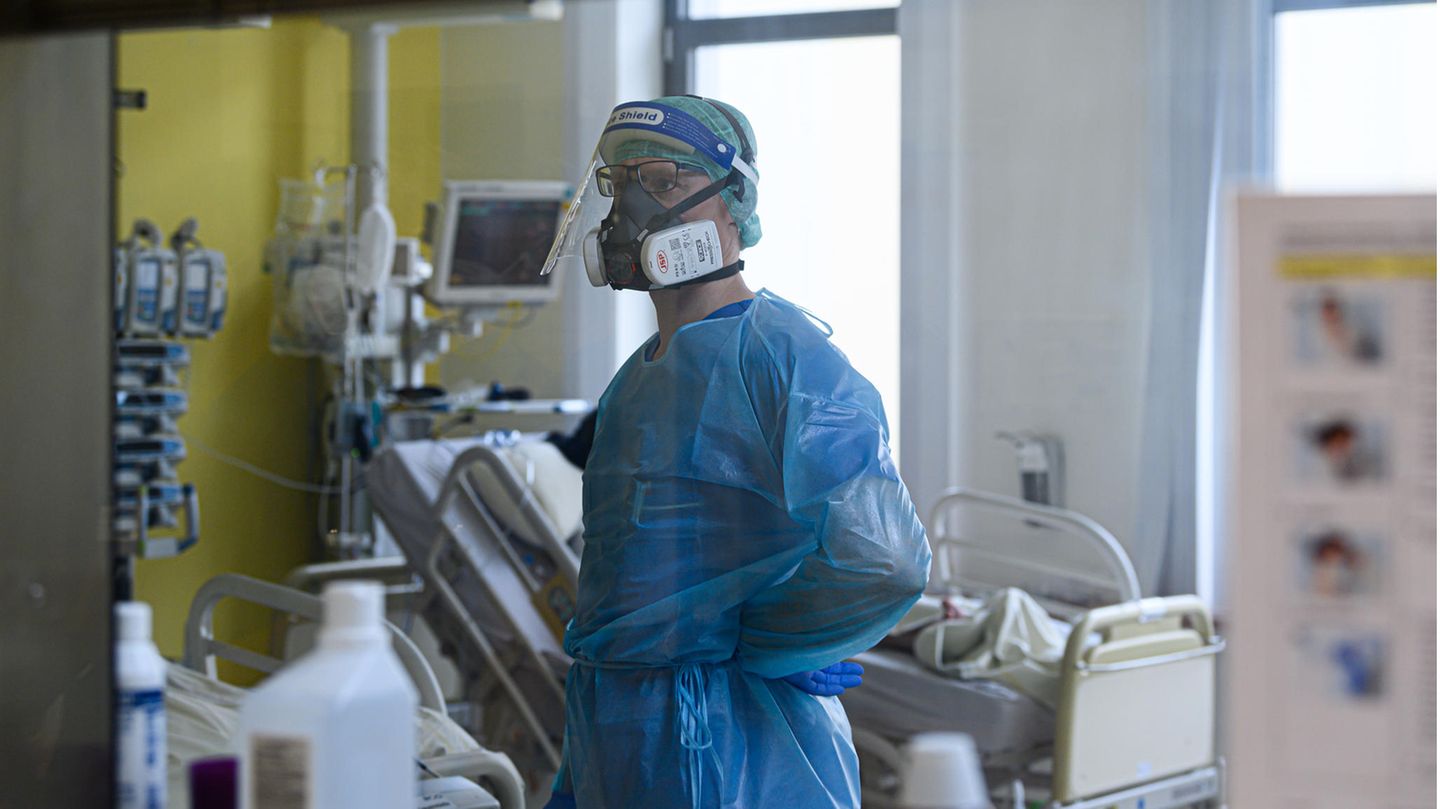All parties see a need for action on the subject of care – the programs for the upcoming federal elections are nonetheless very different. From comprehensive reforms to “Keep it up!” everything is included.
CDU / CSU
The Union wants to make the working conditions of the nursing staff more attractive through “reliable duty rosters”. Regarding salaries, she pointed out that she had improved the pay of the nurses. The bureaucracy is to be reduced, and the Union wants to invest 500 million euros in robotics and digitization of care. The welcoming culture for foreign nurses is to be strengthened.
In the opinion of the Union, long-term care insurance has proven itself and should be further developed. In order to counteract disproportionately increasing contributions, the long-term care provision fund is to be extended until 2050.
She wants to create “reliable and needs-based supply structures” for those in need of care, caregivers and relatives who are caring for them. The previous services for offers of short-term care and prevention care as well as care services are to be summarized in a budget.
The Union is committed to the diversity of providers – which means that municipal, non-profit and private providers should continue to operate hospitals, nursing homes and outpatient care services (editor’s note: municipal providers are legally barely represented in care for the elderly). The “health and care industry” should be strengthened as an “outstanding economic factor in Germany”.
In hospital planning and financing, the Union wants to “take much greater account” of universal basic and standard care. She wants to support the federal states and municipalities in “implementing district-related and cross-sectoral supply concepts”, but otherwise relies on the “tried and tested self-administration”. Prevention and rehabilitation are to be strengthened in order to prevent the need for care for as long as possible.
Shortly before the election, Union Chancellor candidate Armin Laschet announced the introduction of a care lid in his immediate program. Those who live in the home should not pay more than 700 euros a month for care costs. When Health Minister Jens Spahn, also CDU, wanted to introduce a similar lid in early summer, the CDU leadership rejected the project stern-Information as too expensive.
Conclusion: The promises are often vague and non-binding. Otherwise, the ruling party praises itself for what has already been achieved. Overall, a clear “keep it up!” ()
SPD
For nursing staff, the SPD wants to enforce generally binding industry collective agreements and a nationwide staff assessment framework (i.e. binding nursing keys).
She wants to introduce citizens’ insurance, i.e. abolish private health insurance. She also wants to convert the statutory long-term care insurance into a long-term care citizen insurance, into which all income groups pay. The personal contribution for people in need of care with low and medium incomes should be capped.
Caregiving relatives are to be supported in combining care with gainful employment. There should be an entitlement to 15 months of wage replacement with a reduction in working hours for every close relative from “care level 2”, which can be divided among several caregivers.
The SPD wants to overcome sector boundaries and open hospitals for “outpatient, team-based and interdisciplinary forms of care”. She wants to “end commercialization in the healthcare sector”. The flat rate system is to be revised and “abolished where necessary”. Profits from funds from the community of solidarity should “flow back into the health system as mandatory and as possible”.
Hospitals in rural regions should receive “needs-based basic funding”, and municipalities should be supported in setting up and operating “integrated care centers”.
Conclusion: Very specific promises for those in need of care, caring relatives and caregivers. Fundamental health system issues are also addressed. The SPD tried to implement some goals in the last legislative period and failed because of the coalition partner. ()
The green
For care workers in long-term care, too, the Greens want to achieve binding staffing and the 35 hour week with full wages and reduce unnecessary bureaucracy. The applicable exceptions in the Working Hours Act for the health sector are to be limited in order to prevent overload. Skilled workers should be able to work more independently, the study of nursing science and nursing education should be promoted.
Patients and nurses should have a strong say in the decision-making bodies of the health care system.
The Greens want to introduce citizens’ insurance, into which civil servants, the self-employed, entrepreneurs and members of parliament also pay. With a “double care guarantee”, they want to permanently cap their own contributions for needs-based care. Long-term care insurance should cover all costs in excess of this amount.
The Greens are clearly in favor of cross-sector care and want to establish “care networks with close links to the municipalities” and “regional health centers geared to the common good”. Community health nurses are to be active in rural areas. The party advocates more outpatient, local housing and care forms instead of new homes. Employed relatives, friends and neighbors should use the “PflegeZeit Plus” tool to enable them to receive a wage replacement benefit after three months of full exit and three years of partial exit.
Hospitals should work more towards the common good, the trend towards privatization should be reversed. In place of or alongside the case-based lump-sum system, a “new financing system” is to appear, which “includes a strong pillar of structural financing” so that “decisions are made based on what is best for patients and employees”.
Conclusion: The Greens’ health election program is the most detailed and contains many specific goals. If they were in government responsibility, they would drive a really comprehensive restructuring of the health system. ()
AfD
The AfD wants a performance-based payment of the nursing staff in a collective agreement. The working conditions in nursing homes are to be improved by a nationwide statutory minimum staffing level with a buffer rule if it is briefly undershot.
She wants the long-term care and statutory health insurance to be merged in order to avoid interface problems in the care of those in need of care.
The AfD advocates strengthening home care and wants to support caregiving relatives by promoting an “extensive adjustment of care allowance to care benefits in kind”.
For hospitals in structurally weak areas, the flat rate system is to be replaced by “individual budgets”. The AFD wants to improve outpatient care by “expanding medical practices / polyclinics / medical care centers”, “also under the sponsorship of the municipalities”. She wants to create short-term care places in clinics that will be financed by long-term care insurance.
Conclusion: Clear commitment to the collective agreement in elderly care, but the nursing emergency at hospitals is left behind. The short-term care places already exist in the new care reform law. Otherwise, the program does not seem very specific in many places, caregiving relatives can hardly find themselves with their concerns. ()
The left
The Left wants 100,000 additional nurses for both hospitals and old people’s homes and 500 euros more basic salary. She wants legal staffing for all professions in hospitals and nursing homes.
The party wants to introduce solidarity health insurance, contributions are levied on all income. Full long-term care insurance is also to be introduced. Co-payments and co-payments are to be omitted for both insurances in the future.
The Left wants to relieve caregiving relatives, among other things through more professional day and short-term care offers. Working people should be able to be released for six weeks with full employer-financed wages.
Hospitals want to transfer the left into communal and common good-oriented hands and abolish the case-based lump-sum system. She calls for a profit ban and wants to set up a “federal fund for remunicipalisation” to prevent further privatization. In future, the backbone of the outpatient sector is to be regional care centers, where “in addition to doctors, medical staff and health professions” also other professional groups “such as social workers and lawyers” work.
Nursing facilities should be operated in a communal responsibility with a focus on the common good. Access for transnational corporations should be prevented via a tax certificate in Germany.
Conclusion: The left has some good and concrete goals, but where it wants to get 200,000 caregivers ad hoc remains open. A far bigger revolution would be needed for their ideas for fundamental restructuring of the health system. ()
FDP
The FDP wants to improve the working conditions of nursing staff by introducing the personnel assessment instrument “PPR 2.0”, which means: fixed, for all mandatory personnel key, which requires more staff than the previously applicable nursing staff lower limits. The PPR 2.0 has already been scientifically validated, the CDU prevented its introduction. The Liberals propose “pricing” of the bureaucracy – whoever requests it should pay (for example health insurance companies, editor’s note). The FDP also wants to relieve nursing staff through robotics and digital applications.
It wants to enable performance-based permeability of training and further education in nursing, which enables the path from nursing assistant to professorship.
The FDP wants to supplement long-term care insurance with elements of capital coverage. She advocates a three-pillar model, consisting of social long-term care insurance as well as private and company pensions. There should be a monthly care budget for each person, which they can freely dispose of. For this purpose, all benefit claims of the respective care level should be transferred to this monthly budget.
The party wants to relieve family carers, among other things through more short-term care places, low-threshold counseling offers and telecare.
The FDP calls for more investment in maximum care and smaller specialized hospitals – district hospitals for basic care in rural areas are not mentioned. The priority “outpatient over inpatient” applies. A structural reform in the inpatient sector is intended to “eliminate false incentives for oversupply and an oversupply of hospital services”. “Integrated health centers” are supposed to secure regional basic care with outpatient and short-term inpatient treatments. The outpatient-inpatient sector boundary is to be reduced. The liberal professions in the health sector are to be strengthened. In addition, the FDP wants to reform the prevention law and teach a healthy lifestyle in kindergartens and schools.
Conclusion:A modern view of the nursing profession and a clear commitment to binding personnel codes. The FDP does not seem to be interested in where the many people in Germany with low incomes and salaries (for example: nursing assistants) get the money for private pension insurance, but this is not new. The pricing of bureaucracy sounds promising, but neglecting the small rural hospitals that provide primary care is problematic. ()




